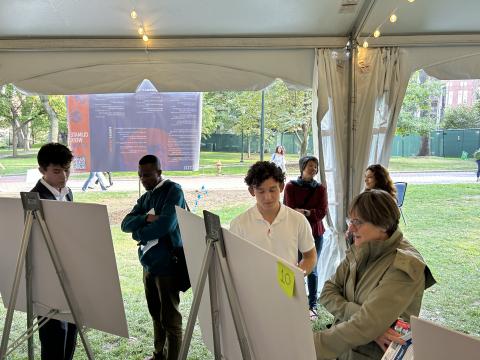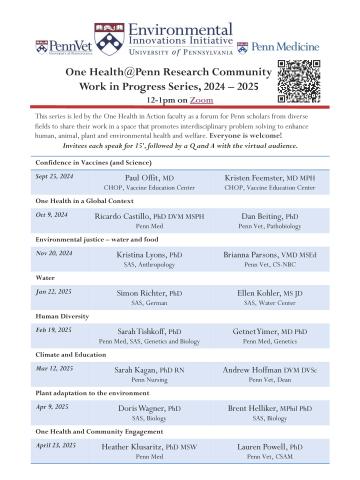Building a home for One Health at Penn
“One Health and climate and the environment are just intertwined,” says Jenni Punt, associate dean for One Health at the School of Veterinary Medicine and one of the leaders of the Environmental Innovations Initiative’s One Health @ Penn research community, which recently received support to extend its efforts with a second year of funding. Together with Penn Vet’s Julie Ellis, co-director of the Wildlife Futures Program, Hillary Nelson, director of the Master in Public Health program, and Brittany Watson, professor of clinical studies and advanced medicine at Penn Vet, Punt has developed several initiatives and a monthly seminar series to spark connections and interdisciplinary collaboration to address “wicked,” or highly complex problems related to health.

By Katherine Unger Baillie
“One Health and climate and the environment are just intertwined,” says Jenni Punt, associate dean for One Health at the School of Veterinary Medicine and one of the leaders of the Environmental Innovations Initiative’s One Health @ Penn research community, which recently received support to extend its efforts with a second year of funding. Together with Penn Vet’s Julie Ellis, co-director of the Wildlife Futures Program, Hillary Nelson, director of the Master in Public Health program, and Brittany Watson, professor of clinical studies and advanced medicine at Penn Vet, Punt has developed several initiatives and a monthly seminar series to spark connections and interdisciplinary collaboration to address “wicked,” or highly complex problems related to health.
The concept of One Health refers to the inextricable link between environmental, human, and animal health. It’s a framework increasingly adopted around the world to structure health monitoring, investigations, and interventions, and implicitly urges multi- and transdisciplinary ways of thinking and working.
More than a seminar series
The One Health @ Penn team makes this cross-boundary approach explicit in their seminar series, Research-in-Progress/Work-in-Progress, or RiP/WiP. At each of these monthly, virtual events, two speakers present on their research—often in seemingly disparate areas—for 15 minutes. Then, Ellis poses a question: “If you could engage professionals from other disciplines in your own work, which disciplines would be on your wish list and how do you envision their particular contributions?” The answers, ranging from “Everyone!” to specific fields outside the speaker’s own area of expertise, underscore the need for and power of working across disciplinary boundaries.
Last year the talks were connected by the theme of climate change. Questions from Punt, Ellis, and the audience sparked rich discussions, drawing lines between the seemingly siloed subjects of the two talks. For example, a pairing of marine biologist Katie Barott of Penn’s Biology Department with Bethany Wiggin of the Penn Program in Environmental Humanities led to discussions of ways to leverage the power of storytelling and the striking visual appeal of coral reefs to advance climate action and conservation. Another RiP/WiP brought together Shu Yang of the School of Engineering and Applied Science, speaking about engineering nano- or micro-scale solutions to climate change-driven drought, and David Gouverneur, who presented on designing resilient communities from a city planning perspective. In each case, seminar attendees and presenters left not only knowing one another better, but understanding how their own work might be expanded with input from Penn scholars outside their own department or school.
This kind of broadening of academic communities has been a powerful outcome of the research community, whose efforts were accelerated with matching funds from Andrew Hoffman, the Gilbert S. Kahn Dean of Penn Vet.
“The RiP/WiPs are designed to show how truly transdisciplinary and how broad health is,” Punt says. “If we can't involve the sociologists, the environmental humanists, the anthropologists, the psychologists, we're lost. Think about how, for instance, vaccines were rolled out during the COVID pandemic. If we had had a better understanding of some of the 200 years’ worth of vaccine hesitancy, the psychology, some of that cultural understanding, we would have been in a better place.”
Growing momentum
The research community’s work extends well beyond the monthly Zoom gatherings. During the 2023-24 academic year, the group had two in-person seminars, hosting Scott Weese from the Ontario Veterinary College who spoke about his research on antimicrobial resistance, and Gui Verocai from Texas A&M University sharing his studies and findings related to helminths, a type of parasite that can affect humans and animals alike. To bolster expertise at the intersection of climate and health, the research community funding enabled two faculty members, Hillary Nelson and Elizabeth Woodward of Penn Vet, to complete the Certificate on Climate Change program, offered through Penn’s College of Liberal and Professional Studies.

Other efforts arising from the research community, coordinated by the One Health in Action group, are coming to fruition this year. A course on climate change and One Health, cotaught by Nelson, Woodward, and Penn Vet’s Erick Gagne, open to all graduate and professional students, will be offered in the spring of 2025. Research community members are also working to roll out a One Health Solutions graduate certificate in the fall of 2025, which will have a track geared toward veterinary students and another appropriate for graduate students from any discipline.
This fall, the team plans to mark One Health Day in early November with a series of “flash” talks on One Health, a panel on bird flu organized by Nelson and the Center for Public Health, and a “green” campus tour organized by the student One Health clubs at the Perelman School of Medicine, the School of Dental Medicine, and the School of Veterinary Medicine.
Also funded in part by the EII support, May Truong, director of instructional design and online learning at Penn Vet, and veterinary students Bobbi-Jo Katagiri and Erin Denardo are working on a One Health@Penn website that will collate relevant news, events, and resources for the Penn community and beyond. A group of One Health leaders, with representatives from the dental, medical, nursing, and vet schools, meets monthly to discuss projects and efforts of mutual interest, including efforts to embed One Health lessons in the curriculum.
And building on the success of last year’s series, the research community is continuing the RiP/WiPs with a brand-new speaker lineup and a theme of One Health perspectives on problem solving. Speakers have been paired based on mutual scholarly interests, such as water, plants, design, agriculture, antimicrobial resistance, and more. The full schedule is available here.
Leaning into the framework
A consistent challenge for those working to promote the idea of One Health is simply having to explain what it means. “It can come across as exclusive to people working in the health fields,” says Ellis. “It’s such an important concept but struggles to get people on board.”
Funding agencies have traditionally not awarded grants to explicitly transdisciplinary work and, in the academy, collaborative, cross-disciplinary work doesn’t always earn faculty the same recognition in the tenure process as single-discipline efforts. Daunting hurdles, to be sure, but the One Health @ Penn team is striving to promote the benefits of tackling public and ecosystem health challenges with a One Health framework.
Members of the One Health in Action group have joined the Pennsylvania One Health Task Force, a multi-faceted team of experts who can jointly share information with one another as well as with decision makers and stakeholders in the Commonwealth. And this summer, Punt and Ellis took part in the inaugural One Health University Network for North America meeting at Colorado State University, where they shared challenges and successes of their work with peers in higher ed. Based on relationships strengthened at the meeting, the One Health team at Penn is now collaborating with other institutions to develop a joint federal grant application to accelerate regional plans for health preparedness using the One Health approach.

Punt and Ellis see Penn’s contributions as particularly strong in preparing the next generation of One Health practitioners. As an example, they point to several dual degree programs Punt helped establish at Penn Vet, which allow students to simultaneously pursue a veterinary degree alongside Master of Environmental Studies, Master of Social Work, Master of Public Health, and other programs.
“We have a lot here at Penn that we can expand upon,” says Ellis. “People are enthusiastic and we certainly have the talent.”
Key to the success of all of these efforts—and any interdisciplinary gambit—is learning how to “be” with experts from a different field. Students who hope to employ One Health strategies in their work must learn to not only avoid discipline-specific jargon, but also adopt new ways of problem solving, negotiating, collaborating, and implementing their ideas.
At a RiP/WiP talk last year, the Graduate School of Education’s Zachary Hermann discussed creating the right conditions for collaboration, noting that such team-based work is not just about identifying who should be at the table; it’s about setting the table correctly. Punt, inspired by his message, firmly agrees that preparation is necessary for One Health progress. “That’s something we are learning, and it’s something we want our students to become adept at in their time here.”